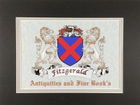
1525 Martin Luther On the Bondage of Free Will - 1st Ed
Similar Sale History


Recommended Items














Item Details
Description
Very Rare,1525 Martin Luther On the Bondage of the Will - First Edition of debate from 1525 original
1525 Martin Luther De Servo Arbitrio: On the Bondage of the Will
LutherÂ’s Erasmus Dispute on Free Will Question, freyen Willen betreffendeOriginal Printed by Johann Lufft, Wittemberg, December 1525
1st edition print of Luthers debate ANNO 1733History of Luther’s De Servo Arbitrio
Martin Luther’s De Servo Arbitrio, was published in December 1525. It was his reply to Desiderius Erasmus' De libero arbitrio diatribe sive collatio or On Free Will, which had appeared in September 1524 as Erasmus' first public attack on Luther.
The topic of Free Will, or rather the lack thereof, is whether human beings, after the Fall of Man, are free to choose good or evil. The debate between Luther and Erasmus is one of the earliest of the Reformation over the issue of free will and predestination.
In 1524 and 1525, seven years after Martin Luther began the Reformation, Erasmus of Rotterdam (1466–1536) and Luther held a “debate” in print entitled On Free Will and Salvation. Erasmus initiated this exchange in the form of an open letter in early 1524, and Luther replied in 1525. Erasmus, despite his own criticisms of the excesses and corruption of many Roman Catholic clergymen, felt that the Church was absolutely necessary. Humanity required guidance to avoid sin, Erasmus reasoned, and the best guidance was the accumulated wisdom of the ages, as embodied in the teachings of the Church. For Erasmus, any reform of the Church had to begin by examining its role in shaping individual morality. He felt this depended on the individual Christian’s acceptance of free will (the notion that humans are free to choose their actions without divine coercion or predestination). In On the Freedom of the Will, Erasmus argues that the Bible can be obscure, ambiguous, and seemingly contradictory on the question of free will, but that on the whole the Bible and Church tradition favor free will. Luther, conversely, felt that the nature of each individual was largely predetermined in the mind and plan of God, and that the Church was only a teacher or guide, not a true molder of man’s nature. In his response of 1525, The Bondage of the Will, Luther does more than argue for predestination. He also strongly asserts the clarity and sufficiency of the Bible (without commentary or church doctrine) on this issue and on all other essential points of faith. On the Freedom of the Will: A Diatribe or Discourse by Desiderius Erasmus of Rotterdam Erasmus Acknowledges His Limitations and States******A Must Have for any Christian Library*******
Condition
Buyer's Premium
- 20% up to $500.00
- 10% up to $1,000.00
- 5% above $1,000.00
1525 Martin Luther On the Bondage of Free Will - 1st Ed
Shipping & Pickup Options
Item located in Powhatan, VA, usPayment










































![[KING, Martin Luther, Jr. (1929-1968)]. No Man is Free Until All Men Are Free. New York, NY:: [KING, Martin Luther, Jr. (1929-1968)]. No Man is Free Until All Men Are Free. New York, NY: Equitable Life Assurance Society of the United States, ca 1970-1971. 18 x 24 in. offset printed poster (som](https://p1.liveauctioneers.com/197/329785/177758438_1_x.jpg?height=310&quality=70&version=1715625218)

![[AFRICAN AMERICANA - VIETNAM]. Free Thousands Jailed in Black Communities. Free Draft Resisters, War: [AFRICAN AMERICANA - VIETNAM]. Free Thousands Jailed in Black Communities. Free Draft Resisters, War Resisters. Stop the Madness Now! New York, NY: Fifth Ave. Peace Parade Committee, 1968. 28 x 22 in.](https://p1.liveauctioneers.com/197/329785/177758395_1_x.jpg?height=310&quality=70&version=1715625218)
![[KING, Martin Luther, Jr. (1929-1968)]. Investigation of the Assassination of Martin Luther King,: [KING, Martin Luther, Jr. (1929-1968)]. Investigation of the Assassination of Martin Luther King, Jr. Washington: Government Printing Office, 1978-1979. 13 volumes, 8vo. Photographic plates and diagra](https://p1.liveauctioneers.com/197/329785/177758436_1_x.jpg?height=310&quality=70&version=1715625218)








![LARGE FRAGMENT OF AN ANCIENT GREEK BIBLE, NOVUM TESTAMENTUM GRAECUM, 1723: Year/Century: 18th century Language: Greek Subject: Religion & Spirituality Binding: Leather Description: [The Greek Bible]. SS. Patrum et scriptorum ecclesiasticorum, cum lectionibus variantibus mss.](https://p1.liveauctioneers.com/6177/328785/177125789_1_x.jpg?height=310&quality=70&version=1714933470)
